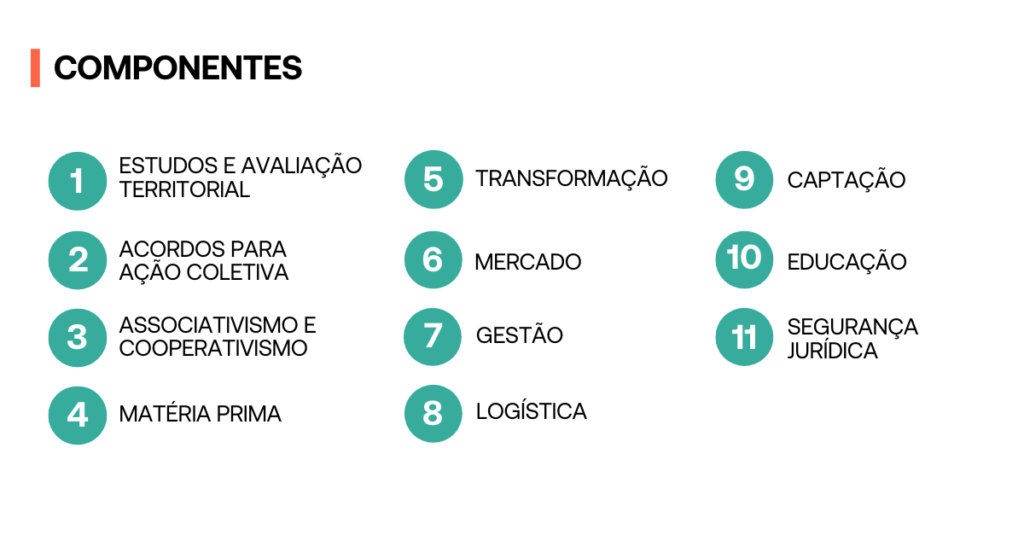Component approach aims to increase the efficiency of actions and scalability of programs
Recognized for its innovative and holistic approach to sustainable socioeconomic development, Instituto Interelos is adopting a structured model in 11 components which, as a whole, address all the necessary steps in the development of a chain.
Improving the quality of life of communities living in conserved environments and with biodiversity economies is a complex challenge. Doing this in a way that generates sustainable processes led by communities is even more difficult, but it is possible.

To develop a territory it is necessary to understand the current conditions, and think about the long-term sustainability of projects, and act directly with local populations in order to provoke or promote changes. This demands more than a project, but a coordinated program, made up of different lines of strategic actions that can promote systemic improvement in all dimensions of development.
The institute's mission remains the same, but the operating logic undergoes a significant change. And one of the lessons learned is that our strategic lines of action, or components, complement each other, so that any aspect stimulated strengthens the entire web of sustainability. Education, for example, can catalyze other components, such as organization, sustainability and environmental management. And so on.
Subscribe to our Newsletter and receive our articles and releases first hand. Click here!
Each program, as well as each territory, faces socio-environmental challenges that encompass economic, social, cultural, environmental, political and even geopolitical dimensions.
When we operate in these territories, some of the measurable impacts we seek include increasing and stabilizing income, creating opportunities for young people, increasing female participation, joining local organizations, and maintaining or increasing biodiversity and productivity .
That New model focuses on results centers, opens fundraising and financing fronts and concentrates expertise in specific areas, providing its own teams and leaders with specific goals and metrics. One of the advantages of acting in this way is that the problem is attacked from several simultaneous fronts, which can generate different solutions and alternative paths. Experience has shown that, to develop a production chain, it is essential to simultaneously intervene in all its links and invest in education, a key point to guarantee the long-term development of the territory.
“No discipline can handle a territory alone.”
Luiz Ferraro
As you point out Luiz Ferraro, agricultural engineer, doctor in Sustainable Development and responsible for developing programs at the Interelos Institute, no discipline is capable of, alone, handling all the complexity of a territory. Therefore, componentization appears as a way of allowing a systematic organization of actions without losing sight of the macro vision.
Luiz Ferraro
Each component, with its specific goals and metrics, contributes to achieving the organization's general objectives, creating a unique synergy between different areas of activity.
The benefits of componentization go beyond gaining efficiency, as replicating an already tested and validated component can substantially reduce the likelihood of errors arising. Scalability, in the same sense, allows for a greater range of impact, reaching communities across the country.
“The objective of componentization is to make each part ready for use and customization according to the context, delivering more results in less time.”
Luiz Ferraro
There are no technological innovations in this proposal, there is nothing new in recognizing the logistical, management, education and industrialization challenges, but there is an integrated perspective to address reality. By adopting this new approach, Interelos is proposing a strategy for sustainability policies, programs and projects in the Amazon region.
By joining forces with local communities and promoting synergy between different areas of activity, the institute is paving the way for a more resilient, equitable and prosperous reality for all.
Subscribe to our Newsletter and receive our articles and releases first hand. Click here!
